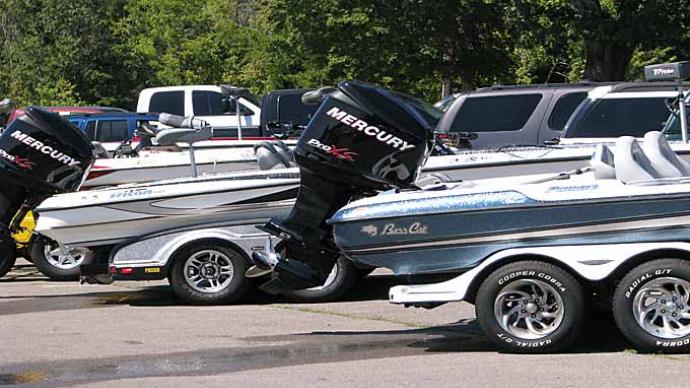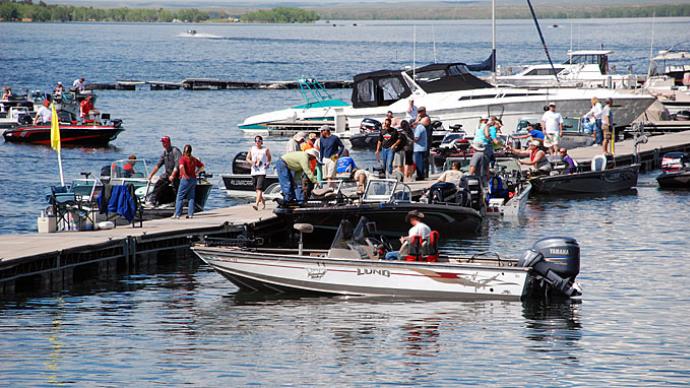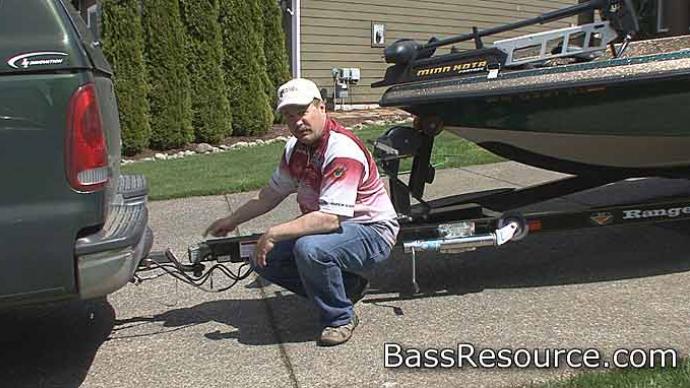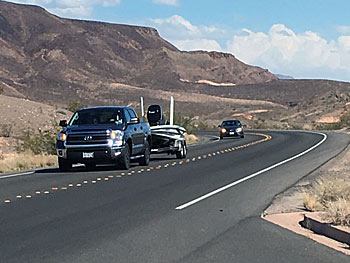
This article is worth reading if you can learn just one new thing about boat maintenance or towing. I’ve had Ranger Boats and Mercury Outboards for 28 years and recently learned three new things. I believe these simple tips could save us from future breakdowns and keep money in our pockets.
For starters, my boat was recently in The Anchor Boat Shop in Reseda, Calif., and Charles, the shop’s mechanic, found some issues with my 11-year-old rig. He took off the engine prop, removed some fishing line (probably mine), and found that the replaceable drive sleeve was cracked on further inspection. That’s the large rubber cylinder behind the prop. He explained that this could cause some significant problems if not replaced. That was a no-brainer and only about $20. I could have replaced it with a fancy one (not rubber) that would last forever for about $85, but I chose the $20 one. I recommend the fancy one if you tend to travel at high speeds, especially on rough water. It’s the rough water that cracks the rubber drive sleeves.
He also noticed fluid leaking out from under the motor. It wasn’t oil because they had already replaced the hose that carries oil from the container to the engine a week earlier. The leak was coming from the trim cylinder. That’s the stainless steel cylinder that your engine rides up and down when you trim. Charles told me that the cylinder should be wiped off before using my boat every time. Here’s why. The cylinder can pick up dirt and sand while you’re on the road or if you store your boat outside, as I do. We get lots of wind where I live. Sand and dirt can work their way into the cylinder and erode the seal.
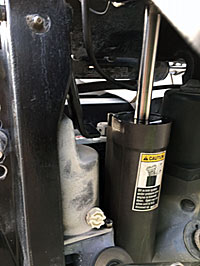
I highly recommend wiping off the cylinder after putting the plug in the boat. It takes just a few seconds and could easily extend the life of the cylinder. The guys topped off the fluid, and maybe if I follow their advice, I can put off replacing that seal for a while.
My boat was in the shop the week before because of a broken shifter. Charles fixed it, and I took the boat out a few days later to try it out. I backed off the trailer and then tried to put it in forward, and it wouldn’t respond, and that’s why the boat went back to the shop. Charles checked it out and called me the next day and said there was nothing wrong! Don’t you love it when a mechanic tells you that after it didn’t work for a whole day on the lake? After we considered all the symptoms, we both came up with an answer. Most shifters have a throttle button. I have a 225 Mercury Optimax, and I never have to push that button in to give it gas when I start it. Somehow that button was jammed in, and that’s why the boat would only go backward or stay neutral. This type of thing only needs to happen to me once, and I learn my lesson just like my boat not starting because the kill switch is off. That lesson took me three or four times to remember. Here’s something else I didn’t know. According to Charles, you shouldn’t shift the shifter back and forth when your motor is off. That can cause some additional problems down the road; I mean lake.
I would like to share some towing tips, especially for new boat owners.
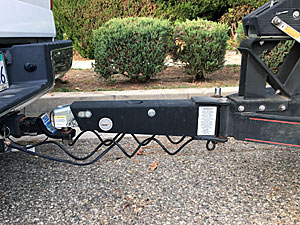
When matching your boat trailer with a vehicle, the trailer tongue should remain level when attached to your vehicle. If it isn’t, you need to make the proper adjustments by raising or lowering the tow ball. Sometimes you only have to turn the bar over and reattach the tow ball. A trailer tongue that’s not level will create uneven weight distribution, which could affect your tires, maneuverability, and road friendliness.
Secure the front bow strap on the trailer as tightly as possible so the boat's bow fits snugly on the mount. If the boat is slightly off the mount, it will bounce while driving on the road, which is not good.
It’s all right to tow with the big engine raised and locked, but it’s even better to use a transom saver. The investment you make in a transom saver pays big dividends. It will secure the engine and re-distribute its weight from the back of the boat to the trailer. This saves wear and tear on your trailer tires.
The transom tie-down straps are your insurance that the boat will stay in place on the trailer. Always use them and be sure they’re tightly cinched when on the road. On the humorous side, remember to unlatch them before launching! I’ve witnessed seasoned boaters forget that one detail, and it’s pretty embarrassing when the boat won’t come off the trailer – especially during a tournament.
Use the proper tires and the recommended air pressure to inflate and maintain properly. Trailer tires are different from automobile tires. The load-carrying capacity of your trailer is based on the tire pressure. Additionally, inadequate tire pressure may void your tire and trailer warranty and even lead to an accident. Using the wrong tires can affect gas mileage and the smoothness of the ride. Even worse, they might come apart while you’re driving down the highway. You can tell when a car tire goes flat. However, that is not always the case when a trailer tire goes flat, or the tread is about to come off.
There are many trailer wheels, axles, spindles, and bearings. Some require very little maintenance, while others should be checked and greased regularly. A whole trip can be ruined by one bearing burning up or a spindle snapping from heat. Take time to read your manual and follow the maintenance requirements. Ignorance is not a virtue in this case. I learned these lessons the hard way more than once. Don’t ignore weird noises coming from your wheel by hoping the sound goes away. It won’t. There could already be some damage by the time you hear a racket. And you may not realize one of these problems while driving down the highway, so if there’s no one in your boat to alert you to a noise when launching, turn off the radio and put your window down and listen.
Trailer brakes are a must these days. There’s more traffic and higher liability involved if you have an accident. They increase your ability to control your rig and conserve the brakes on your vehicle. Be aware that trailer brakes can heat up just like a vehicle.
If your brakes should ever jam while you’re backing up, there can be several causes for this. Your backup lights may not be working, or the solenoid could be worn out. If the brake lockout on the tongue fails to work, disengage the brakes by detaching the hydraulic brake line coupler. However, if you do this, you must remember to reattach the coupler.
Regularly check the trailer lights and signals. Preventive maintenance can save last-minute headaches and time. Anticipate the inevitable by carrying extra fuses and bulbs. Because of the different lights on your trailer, your vehicle may require a heavy-duty flasher, especially if the lights appear dim. I say all of this because you wouldn’t want a friendly officer to ruin a fishing trip or hold you up on the way to a tournament by giving you a ticket, would you?
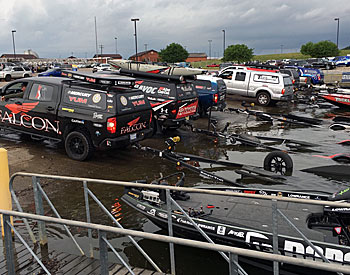
Strive to learn to launch your boat effectively. Approach the ramp and drive down to the water. Make your turn to the left or right and pull up enough to straighten the rig, and then back the trailer into the water. It amazes me how many drivers back down the ramp doing zigzags and jack-knifing still don’t get the trailer lined up correctly. This is time-consuming and irritating for the others waiting to launch. I can criticize these people because I’ve been there and done that. But I ask you, how embarrassing is it for the truck driver to be yelled at by the boat driver, especially when it’s a husband and wife. Some people call it entertainment, but I call it a cause for divorce.
And remember, people who get yelled at walk off the job or quit. Keep your mind focused on the task and take your time because rushing will only complicate things. The best way to learn is to practice, but not on a crowded ramp, and please be patient and kind if you’re teaching someone or the whole mission could fail.
Another thing, be sure to check those carpeted trailer railings (known as bunks) for debris before putting your boat back on the trailer. The smallest lava rock or piece of wood from a lake can cause damage to the boat hull. Just watch for debris on the launch ramp and in the water when you launch and check the bunks before picking up the boat.
In closing, Highway Patrol bird-dogs people who are towing. In addition to good driving, they want to see both safety chains adequately hooked up, and the breakaway cable hooked securely to the vehicle. They constantly check your registration tags, even in a parking lot. If you’ve done everything correctly, then all you have to do is smile at them as they pass you by. I say pass you by because you had better not be speeding!
If you avoid the pitfalls and learn these basics, you should have carefree boating trips in the future. They call it smooth sailing, but I prefer my Mercury Optimax roaring down the river.


